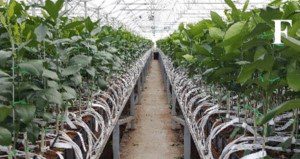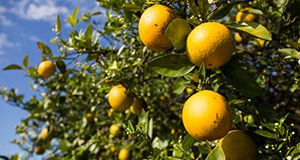Citrus tree production in nurseries can be divided into three stages: production of rootstock liners, transplant of rootstocks into larger containers, and bud grafting. The objectives of this new 6-page publication of the UF/IFAS Horticultural Sciences Department are to provide general information on irrigation and fertilization for production of citrus nursery trees in seedbeds, nurseries and budwood multiplication blocks. This article, written by Rhuanito Soranz Ferrarezi, is chapter 8b of the forthcoming Citrus Nursery Production Guide.
https://edis.ifas.ufl.edu/hs1333
Tag: Citrus Irrigation and Fertilization
Fertigation for Citrus Trees
Microirrigation is an important component of citrus production systems in Florida. For citrus trees, microirrigation is more desirable than other irrigation methods for several reasons: water conservation, fertilizer management efficiency, and freeze protection. Research has shown that when microirrigation systems are properly managed, water savings can amount to as much as 80% compared with subirrigation and 50% compared with overhead sprinkler irrigation. Research has also shown the important advantage of microsprinklers for freeze protection of citrus. This 4-page fact sheet discusses fertilizer solubility and some common fertigation materials. It also offers a fertigation summary. Written by Mongi Zekri, Arnold Schumann, Tripti Vashisth, Davie Kadyampakeni, Kelly Morgan, Brian Boman, and Tom Obreza, and published by the UF Horticultural Sciences Department, September 2017.
http://edis.ifas.ufl.edu/hs1306
Reclaimed Water Use for Edible Crop Production in Florida (SL360/SS561)
 Irrigating edible crops with reclaimed water is a promising, cost-effective solution to Florida's overuse of freshwater resources. Learn more in this 4-page fact sheet written by Jamie Lewis and Alan L. Wright and published by the UF Department of Soil and Water Science, September 2011.
Irrigating edible crops with reclaimed water is a promising, cost-effective solution to Florida's overuse of freshwater resources. Learn more in this 4-page fact sheet written by Jamie Lewis and Alan L. Wright and published by the UF Department of Soil and Water Science, September 2011.
http://edis.ifas.ufl.edu/ss561
SL285/SS499 A Web-Based Irrigation Scheduling Model to Improve Water Use Efficiency and Reduce Nutrient Leaching for Florida Citrus
SL285, a 4-page illustrated fact sheet by Kelly T. Morgan, Edward A. Hanlon, and Thomas A. Obreza, describes an easy to use web-based water-balance irrigation scheduling tool that assists growers in determining irrigation schedules that can improve water use efficiency and reduce nutrient leaching. Published by the UF Department of Soil and Water Science, May 2009.
http://edis.ifas.ufl.edu/SS499
AE444 Variable Rate Technology for Florida Citrus
AE444, a 5-page illustrated fact sheet by Reza Ehsani, Arnold Schumann, and Masoud Salyani, describes this important site-specific management component of precision agriculture which provides economic benefits to growers while reducing the application of agrochemicals. Includes references. Published by the UF Department of Agricultural and Biological Engineering, January 2009.
http://edis.ifas.ufl.edu/AE444

